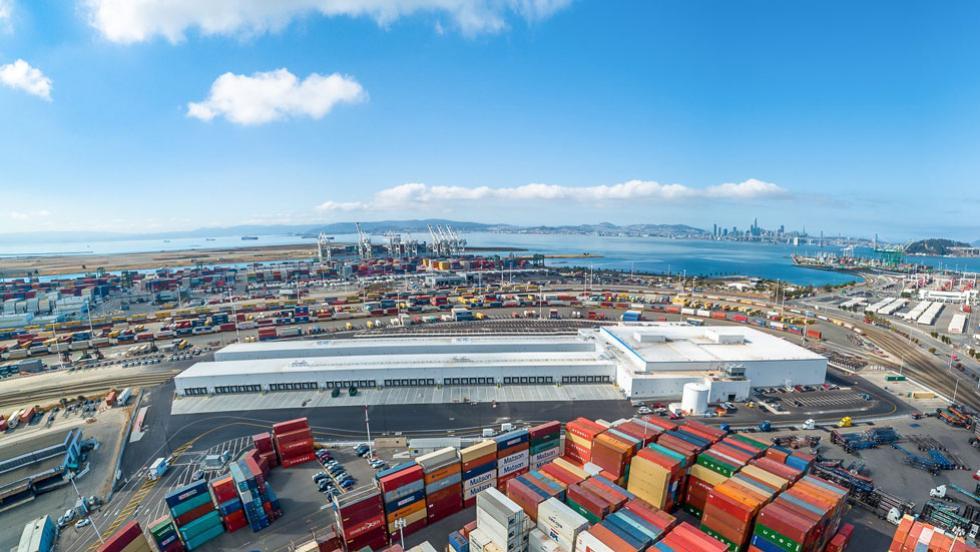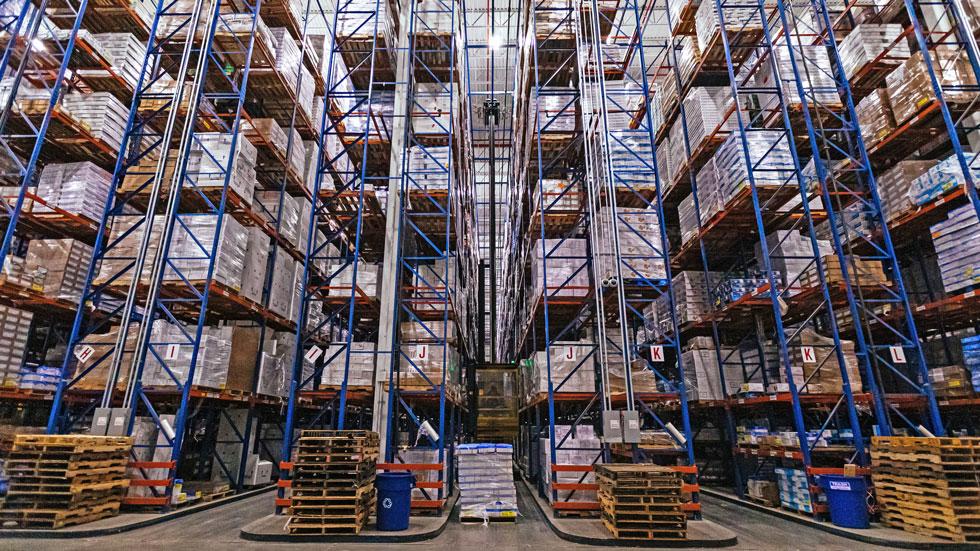
By taking a world view of the food supply chain and acting locally, nationally, and globally to help transform it, industrial REIT Lineage Logistics Holdings, LLC has grown from a small start-up to become a leading provider of temperature-controlled food products and logistics solutions in just 12 years.
Lineage was ranked number one on the 2020 International Association of Refrigerated Warehouses Global Top 25 list of the largest refrigerated warehousing and logistics providers in the world, in terms of total capacity of temperature-controlled space.
“Freezing food is the healthiest and most cost-effective way to feed a global population,” says Kevin Marchetti, Lineage co-founder and co-chairman. “We are reimagining the food supply chain to execute on our purpose to eliminate waste and help feed the world.”
The concept behind Lineage took shape in 2007, when Marchetti and former investment banking colleague Adam Forste united to form Bay Grove, a San Francisco-based principal investment firm focused on building long-term-oriented investment platforms.
The following year Marchetti and Forste identified an opportunity in cold storage and the basis for a buy-and-build strategy.
“In the cold storage industry, we saw a lot of regional companies, many of them family-owned, that couldn’t grow because of access to capital and risk appetite,” Marchetti explains. “We thought that by consolidating these companies and applying advanced technology to make them more efficient, we could revolutionize the industry,” he adds.
Groundwork for Acquisitions
In December 2008, during the depths of the Great Recession, Marchetti and Forste acquired Seafreeze Cold Storage, a single warehouse in Seattle. The purchase laid the groundwork for what would become Lineage’s acquisition strategy, which includes: buying best-in-class regional warehouse operations; executing complex transactions in tight timeframes; deploying sophisticated debt and equity capital structures; and, where possible, keeping former owners involved as strategic advisors.
Since 2008, Bay Grove, the principal investor in Lineage, has helped the company acquire more than 55 companies, 17 of them in the last 12 months. Recent purchases include New Jersey-based Preferred Freezer Services, for over $1 billion; and Emergent Cold, a Dallas-based multinational with market leadership in Australia and New Zealand, for $900 million.
“We buy these properties and optimize them by increasing occupancy and density,” says Lineage CEO Greg Lehmkuhl. “We go in and attack every aspect of revenue and cost to get more out of them.”
Lineage also grows organically through new builds and expansions. Altogether, the company owns and operates more than 320 facilities spanning 57 million square feet in 14 countries. Some 16,000 employees across North America, South America, Europe and Asia-Pacific support more than 5,000 customers, ranging from Walmart, Tyson Foods Inc. and McDonald’s Corp., to family-owned grocery stores.
“For a long time, the real estate asset class didn’t appreciate cold storage and questioned it because of the nature of the business,” Marchetti says. “But I think now real estate investors are more educated, having watched as cold storage has garnered support from a market that has institutionalized, performed well through the COVID-19 pandemic, and is now supporting growing e-commerce.”
Lineage is a prime example. In the U.S. alone, the REIT moves more than 30% of the nation’s temperature-controlled food products.
Less than 10% of American food producers and manufacturers have their own infrastructure to get their food products to consumers, Marchetti explains, “so we’re the critical real estate infrastructure and supply chain expertise for food’s journey from farm to fork.” Lineage provides the storage space, labor, and resources to supply food to grocery stores and restaurants, hospitals, military bases, school lunch programs, and increasingly, e-commerce companies, he adds.
Science as Strategy and Solution
To accomplish this while also eliminating waste in the food supply chain and growing its business, Lineage employs a team of applied scientists to solve the big problems and to reduce costs for customers.
“This is unique in our industry,” Marchetti says. “Our team of physicists, engineers, mathematicians, data scientists, and technologists works every day to bring cutting-edge technologies to traditional logistics processes and set a new standard for energy efficiency.” For customers, Lineage tailors end-to-end logistical solutions that optimize supply chains for speed, efficiency, and cost savings.
When Lehmkuhl was named CEO in 2015, he challenged the company to dramatically reduce the amount of energy consumed in its warehouses. Work by the applied science team in response has resulted in 10 U.S. patents with another four pending, and numerous awards.
An algorithm using lidar (light detection and ranging) scans of warehouses to determine the most space-effective way to store pallets received the company’s first patent in 2019. Flywheeling, an innovation that uses proprietary machine learning and scheduling algorithms to save energy and reduce costs, earned a patent and recognition from the Department of Energy.
A Different Capital Strategy
Lineage has achieved all of this without going public. To raise capital, Lineage looks to private investors.
In September, the company announced that it had raised $1.6 billion in equity from new and existing strategic partners to fund continued growth. “From the acquisition of our first warehouse, we’ve been able to build Lineage by having great investors,” Lehmkuhl says. “This capital raise brings new partners and board participants who’ll further accelerate our ability to grow and innovate.”
Marchetti says Lineage has always focused long term to operate and grow outside the scrutiny of the public market. “We’ll continue to evaluate an initial public offering, but without a timeline,” he adds.
Participants in the most recent fundraising include Oxford Properties, BentallGreenOak, Morgan Stanley Tactical Value, and Cohen & Steers.
“We are in the early stages of what will be a multi-year or even decades-long transformation of the supply chain for preserving, protecting, and optimizing the distribution of food around the world,” says Thomas Bohjalian, head of U.S. real estate for Cohen & Steers, which has invested $100 million.
“We believe Lineage is well positioned to take advantage of this transformation given their global market share of cold storage facilitates and the ever-increasing demand for frozen and refrigerated food,” Bohjalian adds.

Pandemic-imposed Challenges
Lineage has been forced to adjust many of its plans and procedures to deal with COVID-19.
“From an operations and logistics standpoint, having the highest quality and best locations of warehouses has been critical, because much of the food supply has moved from restaurants to retail,” Marchetti explains.
Lineage put many new protocols in place to protect employees and ensure that its processes responded to challenges its customers had been experiencing during this period, Marchetti adds.
Despite these challenges, demand for storage has continued to increase. Lineage has responded by continuing new construction to add needed capacity and acquiring new warehouses to meet customer needs.
“Families are not consuming fewer calories, just different ones through different channels,” Marchetti says. “This means that different parts of our network are seeing big increases in throughput. As we work to help customers adjust to these changes, we’re continually moving product, diverting product, and storing it in other places. This remains a huge challenge.”
Could Lineage store and transport COVID-19 vaccines when they become available? Yes—in theory, but perhaps not in practice. “We’d do it in a heartbeat if we were asked,” Marchetti says. However, he explains that the temperature needed to preserve vaccines is colder than for food, and the logistics for distribution are much different. “We’ve been in touch with the administration to offer our support, guidance, and counsel to develop the best process and procedures—even if our own warehouses don’t wind up housing the vaccines,” he says.
Opportunities and Outlook
Meanwhile, Lineage’s applied science team is reimagining the way the company solves problems.
Lineage already applies mathematics and robotics to store more frozen goods per square foot than was ever thought possible. In some cases, technology has also been used to help customers reduce the number of trucks needed to move product by increasing their use of trailers.
While prospects of achieving still greater savings in space and energy cause excitement, Marchetti says Lineage’s new capital will be used for growth and deploying innovations across an expanding network.
“In Southern California, the demand for space is surging,” he says. The United States will be the REIT’s largest focus for growth, but the European market also presents opportunity and Lineage will look to further connect its dots across the globe.
“With the pandemic, we’ve seen changes in parts of our supply chain,” Marchetti says.
Many of Lineage’s customers are global companies that ship to global markets, he adds. “Our thesis that these customers would like to see Lineage at both ends of their international supply chains is proving out already. Many are leaning on us to create efficiencies across their whole supply chain.”
Richard Barkham, global chief economist at CBRE, says shopper surveys show that nearly half of those now having groceries delivered or buying online with in-store pickup will continue those practices after COVID-19 subsides.
CBRE explored the relationship between e-commerce grocery growth and cold storage warehouse capacity and found that an additional 75 million to 100 million square feet of freezer/cooler space will be needed to meet the new demands.
Barkham predicts continued consolidation among cold storage companies and increased automation, trends initiated by Lineage more than a decade ago.
As for what investors should expect from Lineage in the next 12 months, Marchetti responds, “a lot more of the same, and a lot that will be new.”
Most of the companies Lineage acquired grew organically, according to Marchetti. The company also has some new automation projects coming along, acquisitions will continue, and Lineage expects to add new value-added services to take on more challenges in its customers’ supply chains, with an emphasis on e-commerce and transportation management.
“We’re excited about the future and hope to do more and more as the environment normalizes,” Marchetti says.
